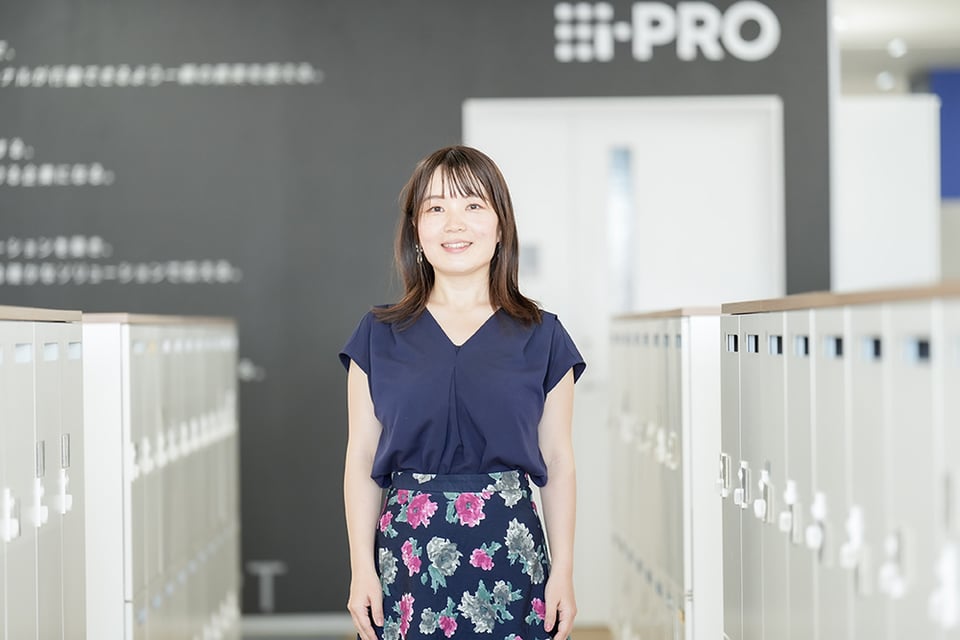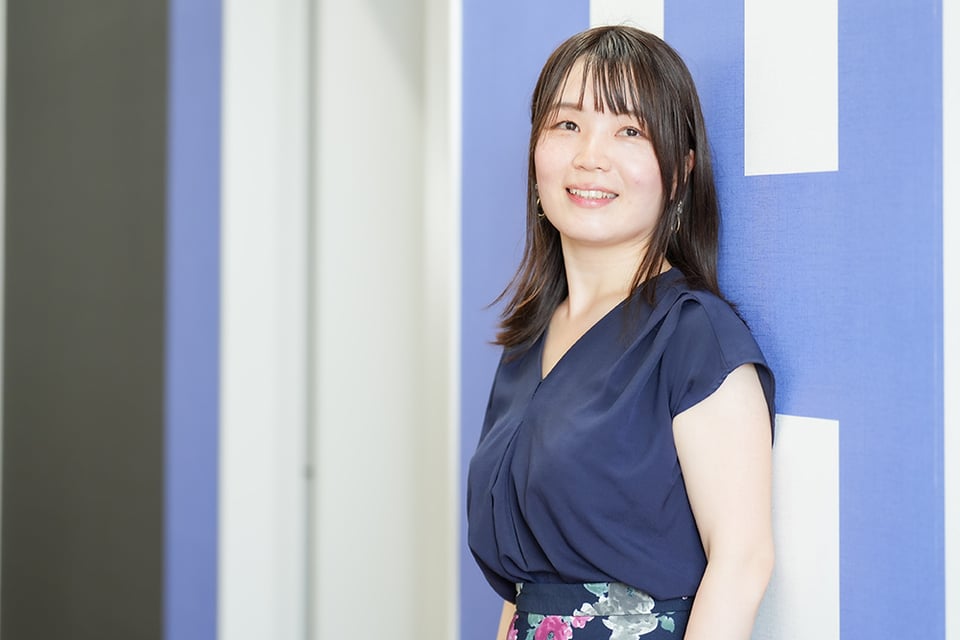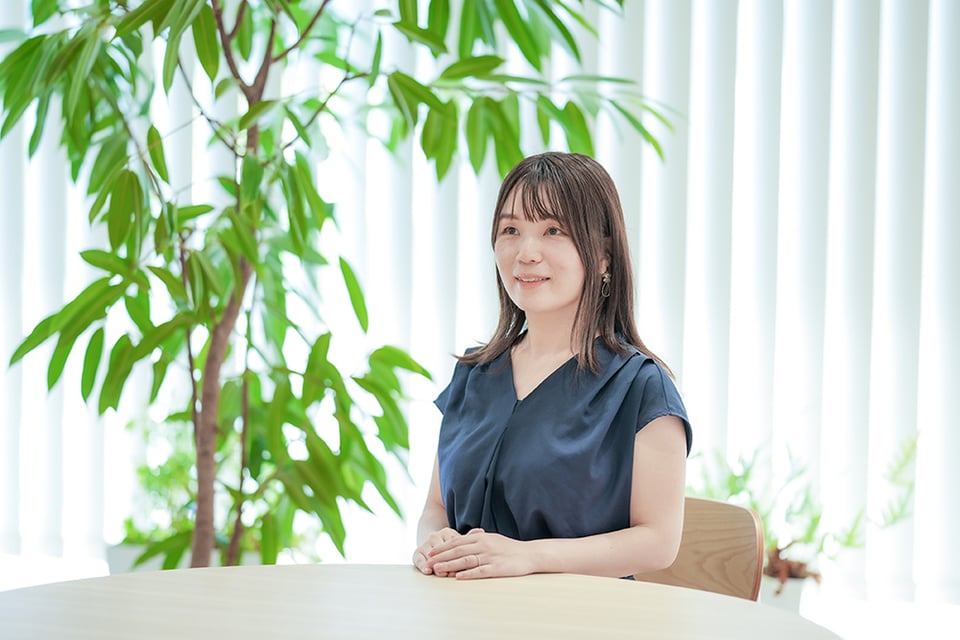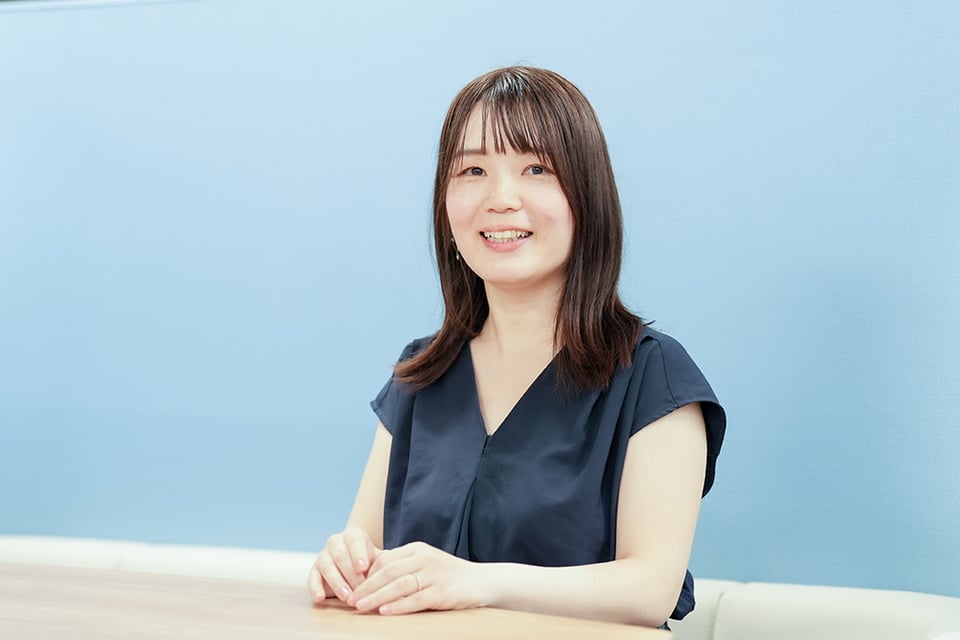After the names of our Chairman Masato Nakao and President Shohei Ozaki, among the staff members of i-PRO, the most familiar name in the company may be Hitomi Nakahara, the subject of this interview. Nakahara, who works in the Human Resources Department, is charged with sending a variety of information via email to everyone in the company. So, every employee—even those who have never met her face to face—must at least be familiar with her name. Nakahara is about to enter a new phase in her career, as she is expecting a baby this autumn. In this interview, she candidly shared her feelings.
A Solo HR Professional from i-PRO’s Earliest Days

You joined the company in 2019, the same year i-PRO separated from Panasonic.
Actually, it means that Chairman Nakao and I joined the company at the same time (laughs). I also attended i-PRO's establishment party held at that time. I actually met many people and felt the energy of the employees and the momentum that they would be going independent in the future.
I’ve been in the Human Resources Department since I joined the company. At the beginning, we had to change the HR system from Panasonic’s to i-PRO’s, which meant I was in constant communication with the people at Panasonic. Panasonic had not done mid-career hiring for a long time, as they tended to hire mostly new graduates so the company was in a state of exploration, checking each of the procedures for joining the company.
So, when i-PRO was launched, I was reminded of that new, venture-like atmosphere. The company was in a state of exploration at the time of its establishment. We did have a computer, but for around one week we couldn’t even open our emails.
What were among the first things you did?
I started out with appointment work and personnel procedures. The work I was doing at that time was completely different from what I am doing now. I had to understand the system that Panasonic had established from the ground up, research how to respond to inquiries from employees, and somehow find someone who understood the procedures and confirm them. I was really groping my way through the process. In the midst of all this, I wanted to eventually build an onboarding system.
Interest in People Is the Basis of My Work

How long have you been doing human resources work?
I’ve been involved since my job at an advertising company. But as I said before, the first company where I worked was a venture business, so I wasn’t focused solely on HR, but was also involved in general affairs, accounting, events, marketing and so on. My next job was at an economic organization, where I worked with the government on a project to match companies with job seekers.
I really liked the human resources profession, and it became my main focus. That’s why I joined i-PRO, because I wanted to continue working in human resources in Fukuoka.
I’m the kind of person who’s interested in people, which I can feel all the more by working in HR. I like people. I’m a certified career consultant, so I have many opportunities to listen to what people have to say, and I really enjoy the work.
I also enjoy sending out email notifications to all our staff. I send these out in the hope that they will cheer everyone up, but sometimes I have to send serious messages. Sometimes I received harsh and painful feedback to my emails, which can be depressing.
What else does your HR work at i-PRO entail?
In a nutshell, in-house public relations and organizational development. If the employees aren’t facing in the same direction as the company, the company won’t be able to be at its strongest. So, I make sure to communicate the company’s strategy and management’s ideas to all employees. The first priority is to communicate so that the company’s direction is aligned with employees’ perspectives and situations.
We believe that it would be extremely unfavorable to attempt this in a closed forum, so we try to maintain transparency to the greatest degree possible, creating a forum where anyone can participate and discuss issues. I think it is important for company staff to have a place like that.
On a global scale, we have an online event called “Global Live Meeting” that is held once each quarter. The event is open to all employees at our five headquarters scattered around the world, with simultaneous interpretation provided in Japanese, English and Chinese. This helps employees get a real sense of trends in other countries, market responses, and so on. We also publish newsletters in three languages to share information about new products and corporate strategies.
Even though I don’t speak English, I am working on a global project, and spend a lot of time thinking about how to convey information in an assertive way to people overseas. It’s not easy, though. I sometimes use my poor English with people at our overseas offices, asking, “We want to try these kinds of events, are you willing to participate?” I feel anxious about whether they really understand what I’m trying to say but I am grateful that people overseas see this as a good opportunity to collaborate internationally and are very supportive.
Are there opportunities for communication between management and employees?
We have them at every event. Sometimes we have discussions on the spot. I have even received a post-event survey from an employee who said, “It boosted our motivation to see that management is taking this seriously.”
I also try to pass on feedback from employees to management, and when someone brought up the opinion that an explanation wasn’t concrete enough, President Ozaki responded, “Then I would like to make time at the next event to explain it to them.” The management side also strongly wants to communicate with our staff through these kinds of opportunities.
I believe that management strongly believes that we need to change things that need to be changed in order to grow i-PRO. We would like to communicate this carefully to employees—with the result, I would hope—that they naturally come to think, “This is how I want to change.”
Since the company is made up of people from various backgrounds, that is why I think all the more that the key to i-PRO’s future is to get these people to agree and take a positive attitude toward change.
The hardest thing is striking the right balance between "flexible," "bold" and "trusted."

What kind of company do you think i-PRO is?
I think it is interesting to see the coexistence of both large company and venture characters. Compared to the large entreprise, I think it’s easier to take on new challenges. I originally came from a venture business background, so I think it’s great to be in that kind of place (laughs).
On the other hand, there are things that I wished could have been done better. I wished everyone would talk over things more with each other. When I first joined the company, I felt culture shock because the company was so quiet. There was no conversation. If I spoke out in situations, I felt embarrassed and “out of place.” Everyone was working quietly, which I think is a great virtue. But if we got up from our seats and chatted, we could learn more about the “next island over,” and I think it would improve our relationship. If I would have talked with someone, I could easily ask them for advice. Compared to when I joined the company, things now are much livelier, but I think it would be good to have more conversation.
When i-PRO was launched, you set forth “bold,” “flexible,” and “trusted” as attributes of its corporate identity. Now after three years, do you think these have been achieved?
I feel that some people are pursuing flexibility so much they are neglecting “trusted.” “Bold“ and “flexible” resemble each other relatively closely, but the question is how to balance these two with ”trusted”.
For example, there was a lack of transparency in our responses. Of course, if they were transparent, we could be attacked by people within the company. But that is something we have to be prepared to accept.
It is a problem if you cannot say “I can't do it,” and it’s also a problem if you cannot ask “What should I do about this?” I think it shows sincerity to say so, but there are people who can’t do it. On the contrary, there were times when I felt that they were maintaining transparency and taking sincere actions. One department was in the midst of a difficult situation, and they were properly open about the situation within the company. That way, the staff could mutually understand each another’s thoughts and feelings.
The words of one person in that department still inspire me today. “I'm sure people will complain for the next 1 or 2 weeks, but it’s part of my job to do it.” Also, because it will never be possible to fulfill 100% of people’s expectations, it’s important to be able to say “I'm sorry” in a direct manner when employees complain that the system is difficult to use.
A Model for Balancing Child-Raising and Career

You’re expecting a baby in the fall. Is i-PRO a good place for women to work?
I don’t mean to come across as a sycophant, but I think it’s very easy to work here. i-PRO is overwhelmingly a male-dominated company, but I’ve never felt uncomfortable just because I’m a woman. Also, the systems are well organized. That’s one thing that is different from venture companies (laughs).
We have a system in place for childbirth and childcare, and even a system to subsidize babysitting costs. There were several male staff who took childcare leave, and I felt oddly reassured, thinking that since men also take childcare leave, it would be okay for me to take it as well.
I will be the first employee to have a baby since i-PRO was established, but there are several female employees in the Human Resources Department who have children, so I was able to talk with them about a number of things, which was also reassuring. The HR department of i-PRO is predominantly female. I think it’s difficult to talk to men about childbirth, but I think that if women in the other departments would consult with the HR people first, they would be happy to be told “I’m so glad you got pregnant” by a female co-worker.
Do you think i-PRO will help you develop your career prospects while raising children?
Well, I think this is a company where it is easy to balance childcare and career. It depends on the type of job, but as long as you communicate well with your supervisor, it is easy to work from home. In fact, I was very grateful to be allowed to work from home when I was suffering from morning sickness. I think this kind of flexibility is important for working while raising children.
As a side job, I give lectures to university students and conduct simulated interviews for people who want to change jobs, but balancing childcare and a career is much more difficult than balancing a day job and a side job. I believe that my husband’s help is indispensable for this, so I always tell him, “We are destined to be together.” When I want to ask for help from those around me, I speak up about it honestly. While doing so, I challenge myself to balance child-rearing and work. If I can actually manage both, I can serve as a model for other women at i-PRO, and I think it will provide peace of mind for female employees who will be raising children in the future..




